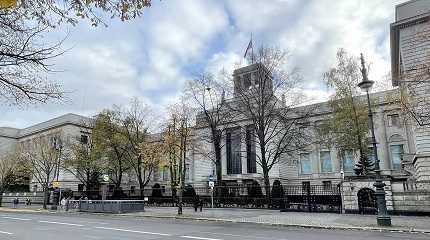
BERLIN, May 31. /TASS/: The German government made the decision to close by this November its consulates general in the Russian cities of Yekaterinburg, Kaliningrad and Novosibirsk, after Moscow’s earlier decision to cap Germany’s diplomatic staff stationed in Russia at no more than 350 people, a German diplomat said on Wednesday.
"Structural changes will be required," German Foreign Ministry Spokesman Christopher Burger told a news briefing. "In order to follow Russia’s instructions regarding the cut in our personnel, the German government made a decision to close its Consulate General offices in Kaliningrad, Yekaterinburg and Novosibirsk."
"The operational work [of the offices] has already been significantly limited and they will be closed before November," Burger said, adding that Moscow’s decision regarding the reduction in German diplomatic personnel in Russia was "a step toward escalation."
The diplomat noted that Moscow's actions are forcing Berlin "to make very significant cuts in all areas of its presence in Russia."
According to him, the German government also made a decision to reduce the presence of German cultural institutions in Russia, including German schools and the Goethe Cultural Center (Goethe-Institut), to the bare minimum.
Burger added that the German Embassy in Moscow and the Consulate General in St. Petersburg remained operational.
On May 27, German daily Suddeutsche Zeitung reported, citing sources, that hundreds of German diplomats, teachers and staff of the Goethe Cultural Center working in Russia would leave the country by the end of May.
The newspaper attributed the staffing cuts to Moscow's decision to cap the number of employees of German institutions in Russia at a maximum of 350 people. Among those who reportedly would have to leave the country are diplomats and cultural representatives, including teachers and staff of the Goethe Cultural Center.
Later, on May 27, Russian Foreign Ministry Spokeswoman Maria Zakharova told the DPA news agency that Moscow had acted in response to Berlin’s anti-Russian steps, but did not initiate any unfriendly actions on its own. She pointed out that the German Foreign Ministry took steps that were kept secret from the public and had previously denied that Berlin was expelling Russian diplomats, who nevertheless returned to Russia.
On May 29, Zakharova stated that Russia would respond "very tangibly" to any new steps Germany might take to reduce Russia’s diplomatic presence in the country.
She stressed that Russia had introduced quotas on the number of employees at German foreign missions as a retaliatory move, but Berlin can decide on its own which members of its staff will have to leave their posts. It was Berlin that took the first steps to reduce Russia’s diplomatic presence, she emphasized.




